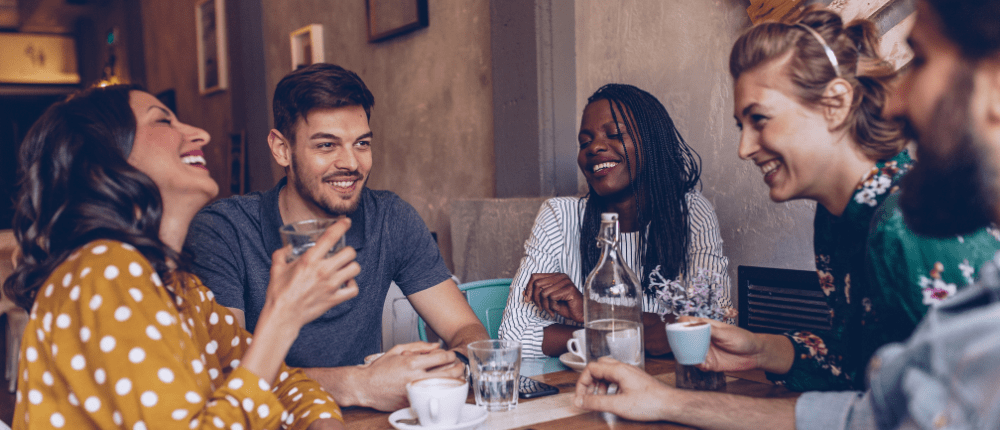
This website uses cookies to improve your experience. We'll assume you're ok with this, but you can opt-out if you wish. Read More
The Next Round: What happens after you change your drinking?

The sun is shining and the world is opening up again post-pandemic, and we know that our Club Soda community members have been looking for sober socials to attend over the summer months. At Club Soda, we’re focusing our efforts on some pretty big future plans, so we’re no longer hosting our own sober socials. We have, however, got lots of knowledge and experience in hosting events, festivals, talks, and much more, so we thought we’d share some advice with you if you’re thinking of starting up a group in your local area.
Setting up a social group can generally be an enriching thing to do, especially if you know that you’re able to help support others. As we know from our amazing Club Soda community, having a support system that helps us to overcome challenges with support and understanding is the key to lasting change. For some, connecting in person is a much more effective way to feel like a part of the tribe.
We know of many events in and around the London area. If you’re in a more rural area, however, you might not have the same opportunities to engage with other people who are in the same headspace as you. Setting up sober socials could be a great way to get people together who might be more scattered and don’t usually have a communal place to congregate. Having sober socials to attend could be the focal point as far as connection and geographic location to share personal experiences and meet like-minded people.
The most important reason to set up events that people can attend without worrying about having to partake in alcohol is just that: taking away the anxiety around socialising with alcohol. As we know, there are many people who choose not to drink, many who have cut down or quit drinking and just aren’t comfortable around alcohol. It’s important to keep socialising if you’ve changed your drinking habits as human connection is a source of joy, happiness, and energy for all humans. Socialising sober is important to learn from others’ experiences, test your triggers, and build confidence in your alcohol-free habits.
Firstly, good planning and forethought cannot be underestimated. Sober socials can be a lot of effort, so it’s important to plan out ideas, think through potential hiccups, and be prepared for all the eventualities. That’s not to say it’s too much effort – creating an environment where you and your peers can feel safe and understood, all while having a really good time, is priceless. It is important to think carefully about what it is you’re aiming to achieve so that when it comes to the event itself, you can relax and enjoy it as much as everyone else.
Here are a few things to consider when you’re starting out:
Finding a venue for your event will need some thought. A boozy pub is not a good choice, and while outdoor activities are great, you’ll need a backup in case it rains. An exhibition or gallery with a stop at a cafe for cake or afternoon tea avoids the issue of alcohol altogether.
Club Soda team member and Queers Without Beers event organiser Josh Kelly suggests that somewhere that serves food like a restaurant or cafe is a great idea as food can be the focal point, as long as it’s moderately priced and available to all. ‘If you’re hosting your event at a restaurant, choose lunchtime instead of dinner as there will most likely be drinking going on in the evening and this can be super triggering for some attendees’.
It’s great to find a venue where you can explain your objective, get them on board with your ideas, and help to promote the venue as well as the event so that you’re setting yourself up for a great long-term relationship with the venue. It’s also really important to explain to them that this is an alcohol-free group, so please don’t pass around the wine list!
If you are choosing a restaurant for your event, then it’s important that they have a great selection of alcohol-free drinks. We know that not many venues have AF beer on draught, but a fridge full of low and no alcohol options is preferable so that you’re catering to everyone’s tastes. A cafe, restaurant, or bar that is as inclusive as possible, offering gluten-free and vegan options, ensures that you’ve covered all bases and that everyone will feel comfortable and happy.
Hosting a sober social will be great fun, but you’re also bringing together potentially vulnerable people. There are a few important things to consider implementing which will ensure that everyone, including you, has a great time.
It’s important that in all communications you make it clear that this is a dry event. There is nothing more triggering or distressing than someone who reeks of alcohol turning up to a sober event. While it’s important not to demonise that person, you will need to ask them to leave in order to keep the rest of the group safe. This is a worst-case scenario that can be avoided by being very clear about your non-drinking policy.
This could be someone’s first event after giving up drinking, so one organiser needs to be aware of those who may be struggling. It could be helpful to some for an organiser to meet them outside 15 minutes before so that they know someone’s face, know what’s happening next, and have someone to walk into the event with them. Offering to do this in your initial contact with attendees could reassure potential guests.
To make sure you’re being as inclusive of everyone as possible, don’t split the bill. Allow everyone to pay for what they had, as they may have had to make choices according to their budget, and try to leave a tip for the venue.
When creating your event, be clear about when the event begins and also when it ends. It might be difficult for some to attend sober socials and be around other people without drinking. If people are only just coping, don’t let the event drag on beyond their comfort zone. Remember, one hour of socialising in a restaurant or bar without drinking is a huge step and you don’t want to be the reason someone felt discomfort.
On this note, it’s helpful to be the person who leaves last. Often, people will have questions, or will feel like you’re their cue to do things. Being there until the last person leaves means that you’ve taken responsibility for your event, and know that everyone left feeling safe and happy.
It’s vital to remember that, while this is a supportive, friendly group, this is not self-help. Don’t give advice unless solicited, as you’re not an alcohol counsellor and you’re not responsible for people once they’ve left the event. Trying to ‘fix’ others’ problems can make the whole event overwhelming and take away the fun for you and for everyone else. Remember, you’re a member of the group – make sure it’s a good thing for you, too!
In the fortnight leading up to your event, you might want to tick these off your sober social planning list, for good practice:
Josh Kelly suggests that to keep things from getting quiet, you should try some social cues and engagement activities during your social event.
‘It’s important to have questions you can pose to your peers that aren’t drink-related’ says Josh. ‘People will naturally gravitate towards sharing their drinking habits – whether they’ve cut down or quit, how long they’ve been alcohol-free, etc – but this focuses the group’s attention on alcohol. While this is completely normal as it’s what everyone at the event has in common, you haven’t quit alcohol to talk about alcohol all the time! Find other things that you have in common to build relationships that are about more than booze’.
If you’re a group of organisers who are responsible for the event then allocate one person to be a mingler. Scan the room and look for those who may not be talking and try to engage them. This is especially important if one person is monopolising the conversation – it’s your responsibility to make sure everyone has their chance to talk, share, and engage.
Some tricks you can try are:
When it comes to marketing your sober socials, Club Soda is here for it! We love to see people getting together in real-life, and we’re here to help promote your events via our weekly email and social media channels.
If you want to promote your events with us, please contact cheers@joinclubsoda.com and one of the team will get back to you.
This website uses cookies to improve your experience. We'll assume you're ok with this, but you can opt-out if you wish. Read More
| Name | Domain | Purpose | Expiry | Type |
|---|---|---|---|---|
| wpl_user_preference | joinclubsoda.com | WP GDPR Cookie Consent Preferences. | 1 year | HTTP |
| PHPSESSID | www.tickettailor.com | PHP generic session cookie. | 55 years | HTTP |
| AWSALB | www.tickettailor.com | Amazon Web Services Load Balancer cookie. | 7 days | HTTP |
| YSC | youtube.com | YouTube session cookie. | 55 years | HTTP |
| Name | Domain | Purpose | Expiry | Type |
|---|---|---|---|---|
| VISITOR_INFO1_LIVE | youtube.com | YouTube cookie. | 6 months | HTTP |
| Name | Domain | Purpose | Expiry | Type |
|---|---|---|---|---|
| _ga | joinclubsoda.com | Google Universal Analytics long-time unique user tracking identifier. | 2 years | HTTP |
| sbjs_migrations | joinclubsoda.com | Sourcebuster tracking cookie | 55 years | HTTP |
| sbjs_current_add | joinclubsoda.com | Sourcebuster tracking cookie | 55 years | HTTP |
| sbjs_first_add | joinclubsoda.com | Sourcebuster tracking cookie | 55 years | HTTP |
| sbjs_current | joinclubsoda.com | Sourcebuster tracking cookie | 55 years | HTTP |
| sbjs_first | joinclubsoda.com | Sourcebuster tracking cookie | 55 years | HTTP |
| sbjs_udata | joinclubsoda.com | Sourcebuster tracking cookie | 55 years | HTTP |
| sbjs_session | joinclubsoda.com | SourceBuster Tracking session | Session | HTTP |
| Name | Domain | Purpose | Expiry | Type |
|---|---|---|---|---|
| mailchimp_landing_site | joinclubsoda.com | Mailchimp functional cookie | 28 days | HTTP |
| __cf_bm | tickettailor.com | Generic CloudFlare functional cookie. | Session | HTTP |
| NID | google.com | Google unique id for preferences. | 6 months | HTTP |
| Name | Domain | Purpose | Expiry | Type |
|---|---|---|---|---|
| _ga_10XZMT03ZM | joinclubsoda.com | --- | 2 years | --- |
| AWSALBCORS | www.tickettailor.com | --- | 7 days | --- |
| cf_clearance | tickettailor.com | --- | 1 year | --- |
| VISITOR_PRIVACY_METADATA | youtube.com | --- | 6 months | --- |
Join Club Soda for 10% off your first order of drinks for UK delivery. Plus get our latest news and special offers for members to choose better drinks, change your drinking and connect with others.
If you get an error message with this form, you can also sign up at eepurl.com/dl5hPn